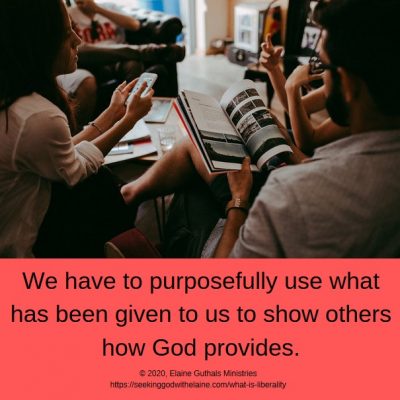When we think about our duty to the poor, how are we to treat them? This devotion looks at liberality and how that equates to loving others as God would have us.
Nuggets
- We honor God by using what He has given us to expand His kingdom.
- It is about generously giving God our best to serve others.
- We have to purposefully use what has been given to us to show others how God provides.
- God will reward those who are generous, including a good conscience and the gratitude of those served.
Devotions in the What Is Charity? series

In the last devotion, we discussed the duty we have as disciples to the poor. I got to the end of it, and I wasn’t ready to end it.
As it was long enough, it had to end. But I kept telling myself that it needed something else.
When I started looking at the verses I had pulled for this devotion, I think this is the part two for which I was looking.
At the beginning of this series, I went to Nave’s Topical Bible and pulled the stuff for charity. It talked about liberality. Let’s look into that.
Let's Put It into Context
According to the Holman Bible Dictionary, liberality means generosity or openhandedness. It is sometimes translated as simplicity, which can pull in wholeheartedly and purely. These give the connotation that it is “without mixed motives or desire for selfish gain” (Holman Bible Dictionary).
It also pulls in stewardship. That is “utilizing and managing all resources God provides for the glory of God and the betterment of His creation.”
Be Generous and Open
“If there is a poor person among you, one of your brothers within any of your city gates in the land the Lord your God is giving you, do not be hardhearted or tightfisted toward your poor brother. Instead, you are to open your hand to him and freely loan him enough for whatever need he has” (Deut. 15: 7-8 CSB)
Has someone ever asked you for something, and you felt yourself shutting down? “I am not going to give them that. The last time they asked me for something, it didn’t end well.” “There is no way on God’s green earth they are going to use this money for what they said they were.”
True, we have to evaluate need and intent for those we either don’t know or who are just acquaintances.
But this isn’t just anyone. This is our brother (or sister). The Homilist said that “he has the same origin, the same nature, the same great Father, the same moral relationships …” as we do.
God expects us to be generous. “… do not be hardhearted or tightfisted … open your hand to him …” (Deut. 15: 7-8 CSB).
We are expected to support each other when the need arises. Yes, we are expected to work and provide for ourselves. But there are times when we need help. We are to sympathize with our brothers and sisters.
Ooo, baby. But aren’t there times we fight the most with our family?
That isn’t even taking into account our possessiveness and greed. Remember, that has its own churchy-word name — covetousness.
Covetousness is a greed for wealth and possessions. Balaam has it. Paul even had it.
To read a related devotion, click the appropriate button below.
Covetousness is the opposite of generosity. The greed makes us hang on and hoard.
God wants us to not focus on the things in life. He wants us to zero in on Him and His people.

Honoring God
“Honor the Lord with your possessions and with the first produce of your entire harvest; then your barns will be completely filled, and your vats will overflow with new wine” (Prov. 3: 9-10 CSB)
What we have was given to us by God. We honor Him by using that to expand His kingdom.
We open our homes to build relationships with those who need to know God. We take food to people who are sick or who have suffered a loss to show His love for them. We help build things, clean things or move things for the same reason.
Okay, I did expand that definition a little if you are taking it literally. I was talking about more than just material possessions. I was talking about skill and knowledge possession. I was talking muscle possession.
I was talking generosity possession.
Miller expanded it also. He said, “Our money — even our time, our health, our talents ….”
My point is we have a lot of things that we can use to honor God. I don’t want people to look at this verse and say, “Not a farmer — doesn’t apply to me.”
Trust me. It applies.
Let’s look at it this way. When it is talking “… with the first produce of your entire harvest” (Prov. 3: 9 CSB), it is talking occupation — employment — career.
So, what is it saying here? Honor the Lord with your possessions and with your career; then your life will be completely filled, and it will overflow with blessings.
It is about generously giving God our best to serve others. We use what we have to do the works He has called us to do.
In my job, I got really good at organizing things and tying things together. I try to do that for you when I make the connections.
Bridges talked about it being a privilege to give in God’s service. It is. It feels so good to help someone.
We have to purposefully use what has been given to us to show others how God provides. When we do, they will see how He blesses us. Our willingness to be generous with our possessions honors God.

A Product of Kindness
“Kindness to the poor is a loan to the Lord, and he will give a reward to the lender” (Prov. 19: 17 CSB)
Generosity comes out of being kind. If we aren’t feeling the kind, we probably aren’t going to be feeling the generous.
Oh, we may go ahead and do the generous — we just aren’t going to feel like it. Then we probably aren’t honoring God.
Thomas used Paley’s definition of a poor man. A poor man is defined as “… he, of whatever rank, whose expenses exceed his resources.”
Ooo, baby. Can we say probably everyone has fallen under that definition at one time or another? Unfortunately, in today’s society, we tend to camp out there.
Nope, the poor aren’t going anywhere. It is really easy to pity them.
Thomas reminded us that our pity has to have two components:
- It has to be practical and meet a need.
- It has to be genuine. We do the right thing for the right reasons.
The right reasons are we are genuinely concerned about them and want to help. We help without expecting anything in return. The wrong reason is we want to get some type of recognition for it.
If we do the right thing for the right reason, we will be blessed.
Blessings
“Give, and it will be given to you; a good measure — pressed down, shaken together, and running over — will be poured into your lap. For with the measure you use, it will be measured back to you” (Lk. 6: 38 CSB)
God will reward those who are generous. Robins noted that two of those reward are a good conscience and the gratitude of those served.
Raleigh had some good advice. He said, “Begin to give as soon as you begin to get. That will prevent the danger of a growing covetousness.” He also suggestion that our giving be based on our income.
Making the Connections #1
Many times, when we think charity, we automatically go to giving to the poor. Do you think it was an accident that we have poverty? I don’t.
I think poverty is a result of the original sin. It is the exact opposite of how God intended us to live.
Do we dig our own holes and bury ourselves in poverty? Sometimes. It is all about choices and how we choose to spend our money.
Jesus said that we would always have the poor with us (Mt. 26: 11). God wants us to love them and help them.
Making the Connections #2
We covered a lot of ground here. Let’s recap.
- God expects us to be generous.
- Covetousness is the opposite of generosity.
- God wants us to not focus on the things in life but to zero in on Him and His people.
- We honor Him by using what He has given us to expand His kingdom.
- We have a lot of things that we can use to honor God.
- Honor the Lord with your possessions and with your career; then your life will be completely filled, and it will overflow with blessings.
- It is about generously giving God our best to serve others.
- We have to purposefully use what has been given to us to show others how God provides.
- Generosity comes out of being kind.
- The right reasons for wanting to help the poor are we are genuinely concerned about them and want to help.
- God will reward those who are generous, including a good conscience and the gratitude of those served.
If we are generous, we show others God’s love. We show His acceptance of them.
Making the Connections to Self-Discipline
We said covetousness is the opposite of generosity. Sometimes, we have to be disciplined in making sure we don’t put more value on things of this world than we do on our eternal life.
How Do We Apply This?
Generosity comes out of kindness. We have to be mindful of how we treat others.
- How are we treating others?
- Why are we treating them this way?
- What do we need to change to treat them better?
We need to let God’s love flow out of us into others. We have to show them that God cares for them.
Father. You have given us so much. Help us to be generous with what You have given us to show others how You provide. Help us to show Your love to all. Amen.
What do you think?
Leave me a comment below (about this or anything else) or head over to my Facebook group for some interactive discussion.
If you don’t understand something and would like further clarification, please contact me.
If you have not signed up for the email daily or weekly providing the link to the devotions and the newsletter, do so below.
If God has used this devotion to speak with you, consider sharing it on social media.
Pingback: Disciples and Charitableness – Seeking God with Elaine
Pingback: Disciples’ Duty to the Poor – Seeking God with Elaine
Pingback: What Does Charity Mean? – Seeking God with Elaine
Pingback: Kindness and Love as Virtues – Seeking God with Elaine
Pingback: Why and How Are We to Live Godly Lives? – Seeking God with Elaine
Pingback: How Did John the Baptist Fulfill Prophecy? – Seeking God with Elaine
Pingback: Joy of Certainty – Seeking God with Elaine